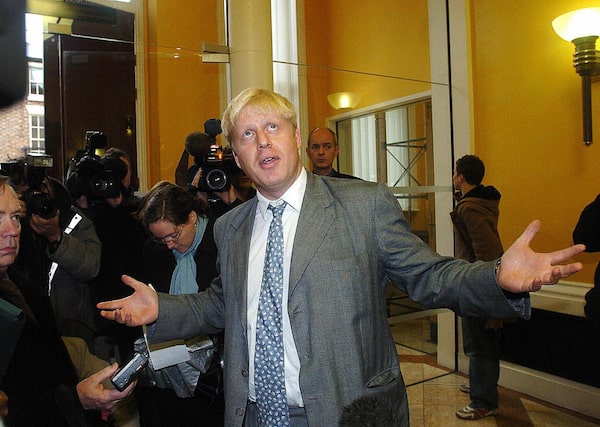
Boris Johnson, seen here in Liverpool in 2004 during his time as a British MP and editor of the weekly Spectator magazine, has long stoked Euroskeptic sentiment. Now, as Prime Minister, he has prorogued the U.K. Parliament for five weeks ahead of the Brexit deadline.JOHN GILES/Getty Images
Boris Johnson began his rise to power by inventing and popularizing a certain tale about Britain in the world. And by trying to turn that tale into reality, he has just done terrible damage to Britain’s place in the world.
As the Brussels columnist for The Daily Telegraph in the early 1990s, the young aristocrat won a large audience by filing endless dispatches about his country’s purported powerlessness at the hands of the European Union’s bureaucracy. It was, his readers were told, little more than an endless plot to transform pints of lager into demi-litres, regulate away the curvature of bananas and force uncouth migrants from the east onto London’s streets. Behind his irreverent bluster and wit was a darker fiction about a meek and disempowered Britain losing its place in a more powerful world.
This week, Mr. Johnson found himself facing an existential dilemma, now as Prime Minister: He had spent three decades promoting the idea that the greatness and independence of Britain’s democratic institutions had somehow been bespoiled by its membership in a 28-country body. Yet, the democratic will of the British people, expressed through their elected representatives and enforced by those great institutions, was opposed to his pledge to leave that body without a negotiated agreement.
He responded on Wednesday by getting the Queen to shut down Britain’s democratic institutions – and, in the process, making a worldwide show of a form of British decline and failure that had not actually existed until he came to office.
Parliament, the country’s sovereign body, has ruled by majority vote that Britain shall not leave the EU without a treaty, and the House of Commons has ruled that any change to the country’s role in the union must be subject to a debate and vote. By proroguing Parliament for five weeks, thus leaving only a few days of sitting before the country’s membership in the bloc is scheduled to expire, Mr. Johnson has given the world a live, real-time demonstration of British decline.
This would merely be tragic if it were true – as Mr. Johnson’s story has it – that Britain had already lost its influence in the world. But it is worse, because he has always been wrong about that.
Britain had, in fact, been a hugely influential country in Europe, its power and voice in democratic affairs, decision-making, crisis management and defence usually far greater than that of any other European country. The European project had turned British democracy, whatever its many flaws, into an example that inspired party leaders and elected officials across the continent.
“Globally, the U.K. has been both a strong promoter and a strong example of parliamentary democracy. Now, it is an example that political leaders in countries in danger of democratic backsliding can point to when they dismantle democratic principles,” says Nicolai von Ondarza, a Europe analyst with the German Institute for International and Security Affairs.
“Now all those who want to weaken parliamentary democracy or the rule of law can refer to the British example.”
Anyone who has spent time in Brussels during the past 30 years has seen that Britain was not a victim of the EU’s bureaucracy and democratic compromises, but was a key driver of them. In any EU office, it has been the British officials who often do the heavy lifting; rare is the German or Dutch Eurocrat hoping to make a mark who would dare do so without a Briton as a key policy mind.
The damage extends beyond Europe. A study of Britain’s role in world affairs, conducted in February by Jess Gifkins at the University of Manchester and her colleagues, found that Britain had played an outsized part in influencing the world’s most important decisions and that Brexit would mean “the U.K.’s reputation is tarnished and its capacity for influence is weakened.” As Sir Jeremy Greenstock, the former British ambassador to the United Nations, put it: “Most people – almost without exception – think we’ve shot ourselves in the foot.”
If you are looking for a golden age in British life – a time when the country had the most respect and influence internationally, when it enjoyed the highest standards of living and the lowest rates of hardship and disadvantage, when its people were most comfortably diverse and peaceful and prosperous – then that era, by most measures, began around the time Britain became subject to the Maastricht Treaty, which created the modern EU in 1993, and ended around the time Brexit took over its national politics, starting in 2016 and reaching its culmination this week.
In other words, Mr. Johnson’s career has coincided with Britain’s greatest historic moment and he has devoted it to delivering that era’s end.
Doug Saunders, the Globe’s international-affairs columnist, is currently a Richard von Weizsäcker Fellow of the Robert Bosch Academy in Berlin.
 Doug Saunders
Doug Saunders